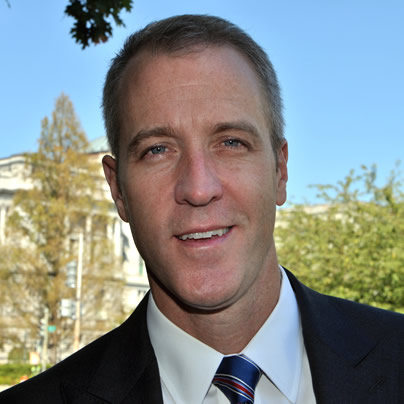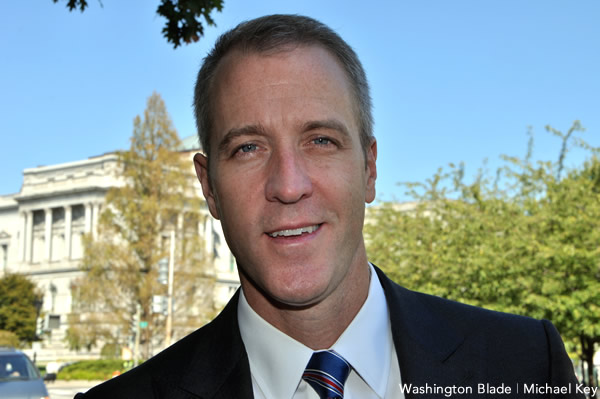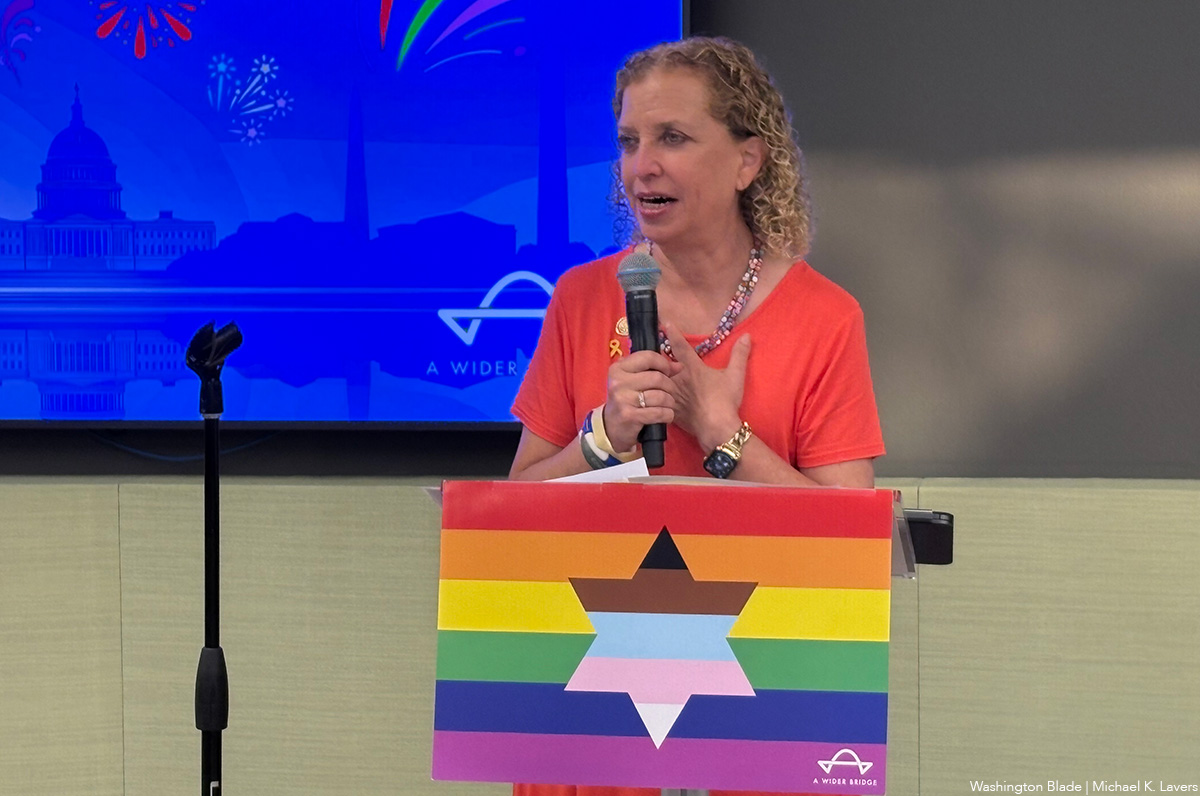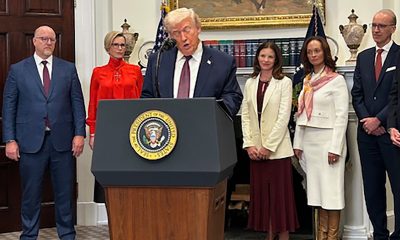National
Election Day brings more out gays to Congress
But balance of power will likely prevent action on LGBT bills


Sean Patrick Maloney was among the openly gay people elected to Congress (Washington Blade file photo by Michael Key)
The results on Election Day were hailed as a milestone as a record number of openly LGBT people were elected to Congress, although prospects for the passage of pro-LGBT legislation next year don’t look promising.
In addition to re-electing President Obama and approving the marriage equality side on ballot initiatives in four states, voters elected at least six openly LGB lawmakers to Congress in addition to electing pro-LGBT lawmakers like Elizabeth Warren in Massachusetts and Sherrod Brown in Ohio.
Tammy Baldwin made history by becoming the first openly gay person elected to the U.S. Senate (see related story) as incumbent Reps. Jared Polis (D-Colo.) and David Cicilline (D-R.I.) were re-elected. Joining them will be Sean Patrick Maloney, who’ll be the first openly gay congressman from New York; Mark Pocan, who’ll occupy the seat Baldwin held in the House; and Mark Takano, a California Democrat who’ll be the first openly gay person of color elected to Congresss.
As of press time, the race to represent Arizona’s 9th congressional district between bisexual Democratic candidate Kyrsten Sinema and Republican Vernon Parker wasn’t yet called. However, Sinema maintained a slim lead in the votes that were already tabulated. If elected, Sinema would be the first bisexual member of Congress.
Chuck Wolfe, CEO of the Gay & Lesbian Victory Fund, acknowledged the night resulted in historic wins in terms of LGBT representation at the federal level of U.S. government.
“It’s without a doubt historic,” Wolfe said. “I think you can talk about the fact that it was history-making, and those that won will be making history for years to come.”
The election results means Congress will look very different in terms of LGBT representation in the wake of Rep. Barney Frank’s (D-Mass.) retirement and Baldwin leaving the House for the Senate. The results also mean that number of openly gay House members will go from four to at least six.
Gay candidates who didn’t win were Republican Richard Tisei, who lost his bid to unseat pro-LGBT Rep. John Tierney (D-Mass.), and lesbian Democrat Nicole LaFavour, who lost her bid to unseat Rep. Mike Simpson (R-Idaho). LaFavour wasn’t endorsed by the Victory Fund.
Despite the excitement, the Election Day results in some respects resulted in the status quo for the legislative and executive branch of the U.S. government from what existed after the 2010 election when no pro-LGBT legislation passed Congress. Democrats retained control of the White House and the Senate, while Republican remain in control of the House.
As of press time, the Senate was poised to have 54 senators caucus with the Democrats and 45 senators caucus with the Republicans, although the Senate race in North Dakota remained too close to call. That would mean a net gain of one Democrat in the Senate. In the House, Republicans retained control of the chamber, but had a slimmer majority of 232 seats while Democrats claimed 191 seats — with 12 races being too close to call.
Chad Griffin, president of the Human Rights Campaign, acknowledged in a conference call with reporters on Wednesday that these results still mean a pro-LGBT majority doesn’t exist in Congress, making the passage of favorable legislation difficult.
On the issue of federal workplace non-discrimination protections, which remain an outstanding issue for the LGBT community, Griffin said in response to a question from the Washington Blade the votes won’t be there to pass legislation known as the Employment Non-Discrimination Act.
“We need to acknowledge that although we certainly made some gains in the Senate, and potentially some gains in the House, we are still short of having a vote for an inclusive ENDA in the House,” Griffin said. “We need to be realistic about that.”
Griffin said “more successes could be seen” on the state and local level and called on the White House to revisit the idea of an executive order barring federal contractors from discriminating against LGBT people, which it said in April it wouldn’t issue at the time.
“It is my hope and belief that we can get an executive order out of this White House,” Griffin said. “It is something that should be done and we will continue to urge our newly re-elected president to do. That would not be the full solution, but it would be a step toward the end goal.”
Tico Almeida, president of Freedom to Work and one of the leading advocates of the executive order, also said it’s time for the White House to reconsider to its decision in the wake of the Election Day results.
“Yesterday was a turning point for our LGBT movement and President Obama has proven that elected officials can stand strongly on the side of LGBT fairness without fear of voter backlash,” Almeida said. “We will continue to push for the president to sign the executive order as soon as possible because every day that passes is another day in which taxpayer money can be squandered on anti-LGBT workplace harassment and discrimination.”
Asked whether the White House would revisit this idea, Shin Inouye, a White House spokesperson said, “I have no updates for you on that issue.”
Almeida also said action could be seen in the Senate to pass ENDA and called for a hearing, mark-up, and full Senate vote in 2013 when lawmakers convene at the start of the next Congress.
“One lesson from recent LGBT advocacy efforts is that we should not wait until the second year of a congressional session to move legislation forward because that’s when some elected officials start getting nervous about the upcoming election and the legislative clock starts to run out of legislative days,” Almeida said.
In the addition to workplace non-discrimination protections, action could be done at the federal level to repeal the Defense of Marriage Act, which prohibits federal recognition of same-sex marriage. Griffin said during the conference call HRC would “continue to push forward” in Congress, but expressed skepticism about passage of any legislation.
“We do have to remember the leadership in the House of Representatives is not a pro-equality set of leaders, so we still have a lot of work to do there, but I can believe we can continue this momentum,” Griffin said.
Griffin placed greater emphasis action from the Supreme Court, which on Nov. 2o will determine whether it will take up litigation challenging California’s Proposition 8 and Section 3 of DOMA. If the court declines to hear the Prop 8 case, it would mean same-sex marriage would almost immediately return to California.
Another question is which states will advance pro-LGBT legislation or relationship recognition bills in the wake of the Election Day results. Griffin said he expects progress there, but said it’s “very early” to determine which states will see action.
Federal Government
Holiday week brings setbacks for Trump-Vance trans agenda
Federal courts begin to deliver end-of-year responses to lawsuits involving federal transgender healthcare policy.

While many Americans took the week of Christmas to rest and relax, LGBTQ politics in the U.S. continued to shift. This week’s short recap of federal updates highlights two major blows to the Trump-Vance administration’s efforts to restrict gender-affirming care for minors.
19 states sue RFK Jr. to end gender-affirming care ban
New York Attorney General Letitia James announced on Tuesday that the NYAG’s office, along with 18 other states (and the District of Columbia), filed a lawsuit to stop U.S. Health and Human Services (HHS) Secretary Robert F. Kennedy Jr. from restricting gender-affirming care for minors.
In the press release, Attorney General James stressed that the push by the Trump-Vance administration’s crusade against the transgender community — specifically transgender youth — is a “clear overreach by the federal government” and relies on conservative and medically unvalidated practices to “punish providers who adhere to well-established, evidence-based care” that support gender-affirming care.
“At the core of this so-called declaration are real people: young people who need care, parents trying to support their children, and doctors who are simply following the best medical evidence available,” said Attorney General James. “Secretary Kennedy cannot unilaterally change medical standards by posting a document online, and no one should lose access to medically necessary health care because their federal government tried to interfere in decisions that belong in doctors’ offices. My office will always stand up for New Yorkers’ health, dignity, and right to make medical decisions free from intimidation.”
The lawsuit is a direct response to HHS’ Dec. 18 announcement that it will pursue regulatory changes that would make gender-affirming health care for transgender children more difficult, if not impossible, to access. It would also restrict federal funding for any hospital that does not comply with the directive. KFF, an independent source for health policy research, polling, and journalism, found that in 2023 federal funding covered nearly 45% of total spending on hospital care in the U.S.
The HHS directive stems directly from President Donald Trump’s Jan. 28 Executive Order, Protecting Children From Chemical and Surgical Mutilation, which formally establishes U.S. opposition to gender-affirming care and pledges to end federal funding for such treatments.
The American Medical Association, the nation’s largest and most influential physician organization, has repeatedly opposed measures like the one pushed by President Trump’s administration that restrict access to trans health care.
“The AMA supports public and private health insurance coverage for treatment of gender dysphoria and opposes the denial of health insurance based on sexual orientation or gender identity,” a statement on the AMA’s website reads. “Improving access to gender-affirming care is an important means of improving health outcomes for the transgender population.”
The lawsuit also names Oregon, Washington, California, Colorado, Connecticut, Delaware, the District of Columbia, Illinois, Maine, Maryland, Massachusetts, Michigan, Minnesota, New Mexico, Pennsylvania, Rhode Island, Vermont, and Wisconsin as having joined New York in the push against restricting gender-affirming care.
At the HHS news conference last Thursday, Jim O’Neill, deputy secretary of the department, asserted, “Men are men. Men can never become women. Women are women. Women can never become men.”
DOJ stopped from gaining health care records of trans youth
U.S. District Judge Cathy Bissoon blocked an attempt by the Department of Justice (DOJ) to gain “personally identifiable information about those minor transgender patients” from the University of Pittsburgh Medical Center (UPMC), saying the DOJ’s efforts “fly in the face of the Supreme Court.”
Journalist Chris Geidner originally reported the news on Dec. 25, highlighting that the Western District of Pennsylvania judge’s decision is a major blow to the Trump-Vance administration’s agenda to curtail transgender rights.
“[T]his Court joins the others in finding that the government’s demand for deeply private and personal patient information carries more than a whiff of ill intent,” Bissoon wrote in her ruling. “This is apparent from its rhetoric.”
Bissoon cited the DOJ’s “incendiary characterization” of trans youth care on the DOJ website as proof, which calls the practice politically motivated rather than medically sound and seeks to “…mutilate children in the service of a warped ideology.” This is despite the fact that a majority of gender-affirming care has nothing to do with surgery.
In United States v. Skrmetti, the Supreme Court ruled along party lines that states — namely Tennessee — have the right to pass legislation that can prohibit certain medical treatments for transgender minors, saying the law is not subject to heightened scrutiny under the Equal Protection Clause of the Fourteenth Amendment because it does not involve suspect categories like race, national origin, alienage, and religion, which would require the government to show the law serves a compelling interest and is narrowly tailored, sending decision-making power back to the states.
“The government cannot pick and choose the aspects of Skrmetti to honor, and which to ignore,” Judge Bissoon added.
The government argued unsuccessfully that the parents of the children whose records would have been made available to the DOJ “lacked standing” because the subpoena was directed at UPMC and that they did not respond in a timely manner. Bissoon rejected the timeliness argument in particular as “disingenuous.”
Bissoon, who was nominated to the bench by then-President Obama, is at least the fourth judge to reject the DOJ’s attempted intrusion into the health care of trans youth according to Geidner.

A Wider Bridge on Friday announced it will shut down at the end of the month.
The group that “mobilizes the LGBTQ community to fight antisemitism and support Israel and its LGBTQ community” in a letter to supporters said financial challenges prompted the decision.
“After 15 years of building bridges between LGBTQ communities in North America and Israel, A Wider Bridge has made the difficult decision to wind down operations as of Dec. 31, 2025,” it reads.
“This decision comes after challenging financial realities despite our best efforts to secure sustainable funding. We deeply appreciate our supporters and partners who made this work possible.”
Arthur Slepian founded A Wider Bridge in 2010.
The organization in 2016 organized a reception at the National LGBTQ Task Force’s Creating Change Conference in Chicago that was to have featured to Israeli activists. More than 200 people who protested against A Wider Bridge forced the event’s cancellation.
A Wider Bridge in 2024 urged the Capital Pride Alliance and other Pride organizers to ensure Jewish people can safely participate in their events in response to an increase in antisemitic attacks after Hamas militants attacked Israel on Oct. 7, 2023.
The Jewish Telegraphic Agency reported authorities in Vermont late last year charged Ethan Felson, who was A Wider Bridge’s then-executive director, with lewd and lascivious conduct after alleged sexual misconduct against a museum employee. Rabbi Denise Eger succeeded Felson as A Wider Bridge’s interim executive director.
A Wider Bridge in June honored U.S. Rep. Debbie Wasserman Schultz (D-Fla.) at its Pride event that took place at the Capital Jewish Museum in D.C. The event took place 15 days after a gunman killed two Israeli Embassy employees — Yaron Lischinsky and Sarah Milgrim — as they were leaving an event at the museum.
“Though we are winding down, this is not a time to back down. We recognize the deep importance of our mission and work amid attacks on Jewish people and LGBTQ people – and LGBTQ Jews at the intersection,” said A Wider Bridge in its letter. “Our board members remain committed to showing up in their individual capacities to represent queer Jews across diverse spaces — and we know our partners and supporters will continue to do the same.”
Editor’s note: Washington Blade International News Editor Michael K. Lavers traveled to Israel and Palestine with A Wider Bridge in 2016.
The White House
‘Trump Rx’ plan includes sharp cuts to HIV drug prices
President made announcement on Friday

President Donald Trump met with leaders from some of the world’s largest pharmaceutical companies at the White House on Friday to announce his new “Trump Rx” plan and outline efforts to reduce medication costs for Americans.
During the roughly 47-minute meeting in the Roosevelt Room, Trump detailed his administration’s efforts to cut prescription drug prices and make medications more affordable for U.S. patients.
“Starting next year, American drug prices will come down fast, furious, and will soon be among the lowest in the developed world,” Trump said during the meeting. “For decades, Americans have been forced to pay the highest prices in the world for prescription drugs by far … We will get the lowest price of anyone in the world.”
Trump signed an executive order in May directing his administration “to do everything in its power to slash prescription drug prices for Americans while getting other countries to pay more.”
“This represents the greatest victory for patient affordability in the history of American health care, by far, and every single American will benefit,” he added.
Several pharmaceutical executives stood behind the president during the announcement, including Sanofi CEO Paul Hudson, Novartis CEO Vas Narasimhan, Genentech CEO Ashley Magargee, Boehringer Ingelheim (USA) CEO Jean-Michel Boers, Gilead Sciences CEO Dan O’Day, Bristol Myers Squibb General Counsel Cari Gallman, GSK CEO Emma Walmsley, Merck CEO Robert Davis, and Amgen Executive Vice President Peter Griffith.
Also in attendance were Health and Human Services Secretary Robert F. Kennedy Jr., Commerce Secretary Howard Lutnick, Centers for Medicare and Medicaid Services Administrator Mehmet Oz, and Food and Drug Administration Commissioner Marty Makary.
Under the Trump Rx plan, the administration outlined a series of proposed drug price changes across multiple companies and therapeutic areas. Among them were reductions for Amgen’s cholesterol-lowering drug repatha from $573 to $239; Bristol Myers Squibb’s HIV medication reyataz from $1,449 to $217; Boehringer Ingelheim’s type 2 diabetes medication jentadueto from $525 to $55; Genentech’s flu medication xofluza from $168 to $50; and Gilead Sciences’ hepatitis C medication epclusa from $24,920 to $2,425.
Additional reductions included several GSK inhalers — such as the asthma inhaler advair diskus 500/50, from $265 to $89 — Merck’s diabetes medication januvia from $330 to $100, Novartis’ multiple sclerosis medication mayzent from $9,987 to $1,137, and Sanofi’s blood thinner plavix from $756 to $16. Sanofi insulin products would also be capped at $35 per month’s supply.
These prices, however, would only be available to patients who purchase medications directly through TrumpRx. According to the program’s website, TrumpRx “connects patients directly with the best prices, increasing transparency, and cutting out costly third-party markups.”
Kennedy spoke after Trump, thanking the president for efforts to lower pharmaceutical costs in the U.S., where evidence has shown that drug prices — including both brand-name and generic medications — are nearly 2.78 times higher than prices in comparable countries. According to the Pharmaceutical Research and Manufacturers of America, roughly half of every dollar spent on brand-name drugs goes to entities that play no role in their research, development, or manufacturing.
“This is affordability in action,” Kennedy said. “We are reversing that trend and making sure that Americans can afford to get the life-saving solutions.”
Gilead CEO Dan O’Day also spoke about how the restructuring of drug costs under TrumpRx, combined with emerging technologies, could help reduce HIV transmission — a virus that, if untreated, can progress to AIDS. The LGBTQ community remains disproportionately affected by HIV.
“Thank you, Mr. President — you and the administration,” O’Day said. “I think this objective of achieving the commitment to affordability and future innovation is extraordinary … We just recently launched a new medicine that’s only given twice a year to prevent HIV, and we’re working with Secretary Kennedy and his entire team, as well as the State Department, as a part of your strategy to support ending the epidemic during your term.
“I’ve never been more optimistic about the innovation that exists across these companies and the impact this could have on America’s health and economy,” he added.
Trump interjected, asking, “And that’s working well with HIV?”
“Yes,” O’Day replied.
“It’s a big event,” Trump said.
“It literally prevents HIV almost 100 percent given twice a year,” O’Day responded.
A similar anti-HIV medication is currently prescribed more than injectable form mentioned by O’Day. PrEP, is a medication regimen proven to significantly reduce HIV infection rates for people at high risk. Without insurance, brand-name Truvada can cost roughly $2,000 per month, while a generic version costs about $60 per month.
Even when medication prices are reduced, PrEP access carries additional costs, including clinic and laboratory fees, office visits, required HIV and sexually transmitted infection testing, adherence services and counseling, and outreach to potentially eligible patients and providers.
According to a 2022 study, the annual total cost per person for PrEP — including medication and required clinical and laboratory monitoring — is approximately $12,000 to $13,000 per year.
The TrumpRx federal platform website is now live at TrumpRx.gov, but the program is not slated to begin offering reduced drug prices until January.

















